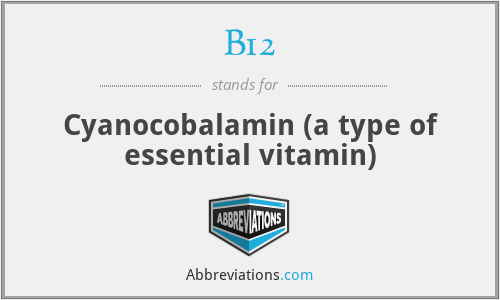What does B12 mean in Drugs?
This page is about the meanings of the acronym/abbreviation/shorthand B12 in the Medical field in general and in the Drugs terminology in particular.
Cyanocobalamin (a type of essential vitamin)
vitamin B12 used to prevent and treat low blood levels of this vitamin. Most people get enough vitamin B12 from their diet. Vitamin B12 is important to maintain the health of your metabolism, blood cells, and nerves
Submitted by Dr.Rupayan Talukder on March 24, 2018
Translation
Find a translation for Cyanocobalamin (a type of essential vitamin) in other languages:
Select another language:
- - Select -
- 简体中文 (Chinese - Simplified)
- 繁體中文 (Chinese - Traditional)
- Español (Spanish)
- Esperanto (Esperanto)
- 日本語 (Japanese)
- Português (Portuguese)
- Deutsch (German)
- العربية (Arabic)
- Français (French)
- Русский (Russian)
- ಕನ್ನಡ (Kannada)
- 한국어 (Korean)
- עברית (Hebrew)
- Gaeilge (Irish)
- Українська (Ukrainian)
- اردو (Urdu)
- Magyar (Hungarian)
- मानक हिन्दी (Hindi)
- Indonesia (Indonesian)
- Italiano (Italian)
- தமிழ் (Tamil)
- Türkçe (Turkish)
- తెలుగు (Telugu)
- ภาษาไทย (Thai)
- Tiếng Việt (Vietnamese)
- Čeština (Czech)
- Polski (Polish)
- Bahasa Indonesia (Indonesian)
- Românește (Romanian)
- Nederlands (Dutch)
- Ελληνικά (Greek)
- Latinum (Latin)
- Svenska (Swedish)
- Dansk (Danish)
- Suomi (Finnish)
- فارسی (Persian)
- ייִדיש (Yiddish)
- հայերեն (Armenian)
- Norsk (Norwegian)
- English (English)
Definition
What does B12 mean?
- B12
- Vitamin B12, also known as cobalamin, is a water-soluble vitamin involved in metabolism. It is one of eight B vitamins. It is required by animals, which use it as a cofactor in DNA synthesis, and in both fatty acid and amino acid metabolism. It is important in the normal functioning of the nervous system via its role in the synthesis of myelin, and in the circulatory system in the maturation of red blood cells in the bone marrow. Plants do not need cobalamin and carry out the reactions with enzymes that are not dependent on it.Vitamin B12 is the most chemically complex of all vitamins, and for humans, the only vitamin that must be sourced from animal-derived foods or from supplements. Only some archaea and bacteria can synthesize vitamin B12. Most people in developed countries get enough B12 from the consumption of meat or foods with animal sources. Foods containing vitamin B12 include meat, clams, liver, fish, poultry, eggs, and dairy products. Many breakfast cereals are fortified with the vitamin. Supplements and medications are available to treat and prevent vitamin B12 deficiency. They are taken by mouth, but for the treatment of deficiency may also be given as an intramuscular injection.The most common cause of vitamin B12 deficiency in developed countries is impaired absorption due to a loss of gastric intrinsic factor (IF) which must be bound to a food-source of B12 in order for absorption to occur. A second major cause is age-related decline in stomach acid production (achlorhydria), because acid exposure frees protein-bound vitamin. For the same reason, people on long-term antacid therapy, using proton-pump inhibitors, H2 blockers or other antacids are at increased risk. The diets of vegetarians and vegans may not provide sufficient B12 unless a dietary supplement is consumed. A deficiency in vitamin B12 may be characterized by limb neuropathy or a blood disorder called pernicious anemia, a type of megaloblastic anemia, causing a feeling of tiredness and weakness, lightheadedness, headache, breathlessness, loss of appetite, abnormal sensations, changes in mobility, severe joint pain, muscle weakness, memory problems, decreased level of consciousness, brain fog, and many others. If left untreated in infants, deficiency may lead to neurological damage and anemia. Folate levels in the individual may affect the course of pathological changes and symptomatology of vitamin B12 deficiency. Vitamin B12 was discovered as a result of pernicious anemia, an autoimmune disorder in which the blood has a lower than normal number of red blood cells, due to a deficiency in vitamin B12. The ability to absorb the vitamin declines with age, especially in people over 60 years old.
Embed
Citation
Use the citation below to add this abbreviation to your bibliography:
Style:MLAChicagoAPA
"B12." Abbreviations.com. STANDS4 LLC, 2025. Web. 15 Jan. 2025. <https://www.abbreviations.com/term/1983989>.



Discuss this B12 abbreviation with the community:
Report Comment
We're doing our best to make sure our content is useful, accurate and safe.
If by any chance you spot an inappropriate comment while navigating through our website please use this form to let us know, and we'll take care of it shortly.
Attachment
You need to be logged in to favorite.
Log In